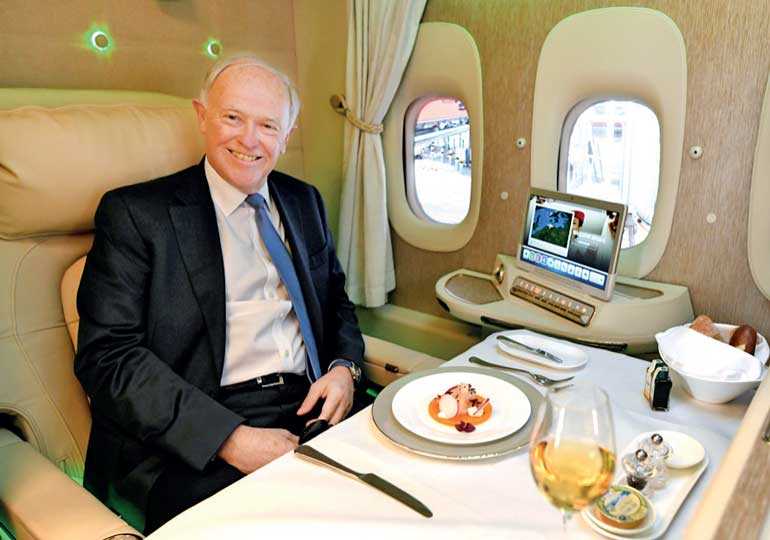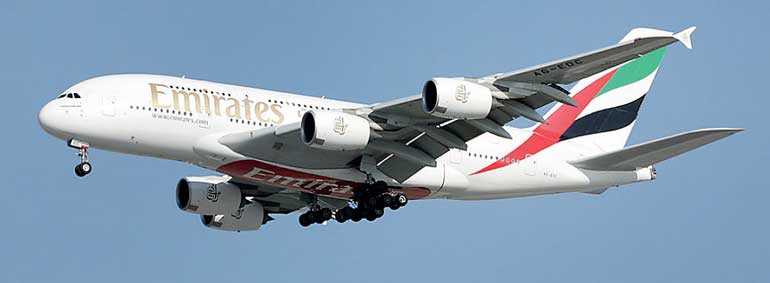Friday Feb 20, 2026
Friday Feb 20, 2026
Monday, 23 April 2018 00:00 - - {{hitsCtrl.values.hits}}

Tim Clark, President of Emirates Airlines, sits in a first class suite during a presentation of Emirates Boeing 777 at the airport in Hamburg – REUTERS
HAMBURG (Reuters): Emirates will commit to purchasing options for 16 Airbus A380 jets from a previously announced $16 billion order that handed a lifeline to the slow-selling jet, the airline’s president said recently.
The Middle East airline placed a provisional order for 20 of the double-decker superjumbos in January, which it has since finalised, with an option for 16 more.
“We will exercise them sooner rather than later,” Emirates President Tim Clark told reporters in Hamburg.
The January order secured the future for world’s biggest passenger jets for at least another decade, saving it from being scrapped.
Emirates is the A380s biggest backer, ordering far more than any other customer and making it the flagship of a fleet that has helped transform Dubai into a major international air hub.
The airline is still evaluating which engines it will use to power its new A380s, which are due to be delivered from 2020, Clark said. The General Electric and Pratt & Whitney Engine Alliance venture powers most Emirates A380s, but it lost out to competitor Rolls-Royce on the latest deliveries.
“There’s nothing wrong with Rolls-Royce, but having Engine Alliance come back in again could make life interesting,” he said.
The airline is short about 100 to 150 pilots, forcing it to reduce the frequency of some routes to Florida in the United States this summer, Clark said. Chinese carriers in particular were offering extremely competitive packages for pilots, he said.
He said the shortage was a short-term situation, adding that Emirates has 170 pilots going through its cadetship program.
Clark said the past financial year had been better than the previous one in terms of profit. “The first half was good and we sustained that through the second half so we’ll be considerably better than we were last year,” he said, adding that fuel prices would be a challenge for the current year.
Emirates is “looking at all sorts of areas” to work with Etihad Airways after the signing of a security agreement between the two rivals in January, he added without elaborating.
Emirates is owned by Dubai and Etihad is owned by Abu Dhabi, both of which are part of the United Arab Emirates.
Abu Dhabi and Dubai companies have recently started to collaborate after traditionally operating independently and sometimes in competition.

Dubai (Reuters): Emirates has revived prospects of non-stop flights to Panama, the airline said, encouraged by development potential in Latin America.
The Middle East airline shelved plans for flights to Panama City from its Dubai hub in early 2016 after it was unable to secure enough code-share agreements to make the route feasible.
“We are still looking at Panama. We had some conversations recently with a delegation from Panama,” Emirates Chief Commercial Officer Thierry Antinori told reporters in Dubai.
Emirates had trumpeted the 8,590-mile (13,824 km) route as the world’s longest, taking 17 hours and 35 minutes westbound.
Code-shares with Panama’s Copa Airlines were to connect Emirates passengers to cities across Central America, the Caribbean and the northern part of South America.
Emirates has shown growing interest in Latin America and Antinori said the airline sees a lot of development in the region.
Flights to Mexico City are also being evaluated, though non-stop services to Dubai may not be feasible because of the Mexican capital’s high altitude.
Mexico is the only country with a population of more than 100 million where Emirates is not operating passenger flights, Antinori said.
When asked if Emirates was considering connecting the route to another city and then onto Dubai, Antinori said different options were being considered but that Boeing’s 777x jets are likely to be able to make the non-stop journey.
Emirates is a launch customer for the 777x, which Boeing plans to start delivering in 2020.
Emirates will start flights to Santiago, Chile, via Sao Paolo in Brazil during July. It operates other so-called fifth-freedom flights, which allow an airline to fly between foreign countries as part of services to and from its home country, including to the United States.